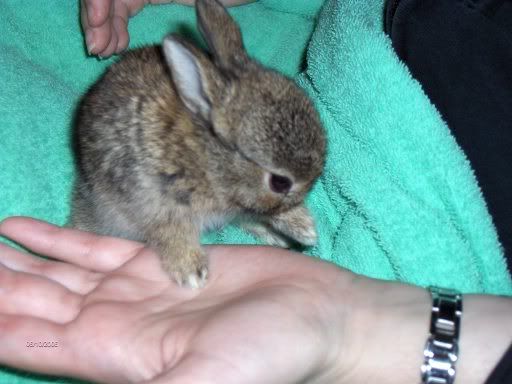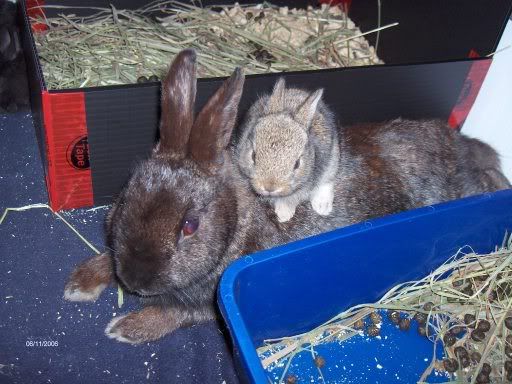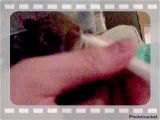Yeah, I'm seeing both opinions -- wild babies caught by cats are given antibiotics to offset the harmful bacteria(?), but the HRS advises no antibiotics for domestics, hmm...
Feeding Orphaned Baby Rabbits
http://www.rabbit.org/care/babies.html
The most likely potential disease to cause infant/weanling mortality is mucoid enteritis. Although it does occur occasionally in weanlings who have been fed by their mothers, it is seen much more often in hand-fed babies and those who are removed from their mothers before eight weeks of age. It manifests as severe diarrhea, anorectic behavior (refusal to eat) and may contain blood or mucous. It also causes bloating and gas.
Mucoid enteritis is caused by a pathogenic bacterial overgrowth, usually of Clostridium spiroforme, in the hindgut (cecum) of the baby, as the normal microflora are attempting to establish. These normal microflora help the baby achieve adult digestive capabilities.
Adult rabbit stomach pH is 1-2, but a neonates' stomach pH is much higher; the stomach and gastro-intestinal tract of neonates is also sterile (containing no living microorganisms.) As babies wean off of milk onto adult solid foods, the gut pH gradually changes by getting a lot of help from the mother's changing milk constituents.
By ten days of age, the babies eyes will have opened, and they will begin eating their mother's cecotropes, (also called "night feces" or "cecal droppings"). Cecotropes help provide the babies with essential nutrients and later, inoculate the hindgut with the essential flora that is needed to metabolize a diet that is changing from milk to solid foods.
Cecotropes are clustered, soft gel-like "bunches" of fecal matter, which are covered with a light mucous film and resemble a mulberry in shape and size. They are manufactured in the adult cecum through "hindgut fermentation," and contain high concentrations of proteins, B and K vitamins, fiber, ash (nitrogen-free extract) and unidentified "energy" elements, as well as the hindgut microbes. Cecotropes are an important part of a healthy rabbit diet and are usually eaten directly from the anus as they are produced.
Remember that our domestic rabbits were developed from the wild European rabbit, whose native diet was lacking in many nutrients. Cecotropes, a self-manufactured source of proteins and other nutrients, provide rabbits with the necessary nourishment to sustain their lives.
Infant rabbits also have an antimicrobial fatty acid in the stomach that differs from digestive gastric acids. It is produced only from an enzymatic reaction with a substance found only in the mother's milk. This action controls the gastro-intestinal microbial contents in the babies' tract.
As the babies begin to wean, at four to six weeks of age, they lose the guardianship of the mother's milk/stomach enzymatic reaction and gradually develop the adult pH of 1-2. Often babies will seem to do fine until this critical stage is reached. It is at this point that both the mother's milk and her cecotropes begin introducing the necessary adult flora (to digest solid foods) into the babies' gastro-intestinal tract.
Note that a diet low in fiber and a high level of grain have been documented to cause enteric disturbances in adult rabbits as well as weanlings. Toxic microbes proliferate in the cecum due to the high-carbohydrate levels, and the lack of dietary fiber slows down the gut motility, providing a perfect environment for the toxins to grow.
In hand-raised babies, it is essential to provide adult cecotropes to the babies after their eyes are open. Usually, the babies will eat the cecotropes immediately, because it the natural thing for them to do. However, if the babies do not eat the cecotropes on their own, add two to three of the individual pellets in the cluster to the formula at one feeding per day for three to four days. As the babies begin to explore adult foods, it is impotant to monitor their fecal output. At the first sign of "mushy" stool, re-introduce cecotropes to them, in formula if necessary.
Depending on the infant's dietary status and stress factors, that may include the babies' immune system (which varies greatly from genetic factors,) the infants' sterile gut may be unable to colonize with normal adult microflora. The gut would then become overloaded with abnormal bacteria, which leads to bloat, electrolyte loss and death from mucoid enteritis. The most common pathogens found in weanling rabbits that died of enteric disturbances are E. coli and Clostridium spp., and protozoa such as Coccidia spp.
Intravenous or intra-osseous fluid therapy supplied by a veterinarian experienced in rabbit medicine may help in some cases, as the ensuing diarrhea severely affects hydration and electrolyte levels. Oral hydration would be of little help in this instance, and the use of antibacterial agents in infants is not advised. Administering antimicrobials in an attempt to control abnormal gut flora may further disturb development of normal gut microflora.
Products such as Baytril (enrofloxacins) are extremely detrimental for use in baby mammals.







